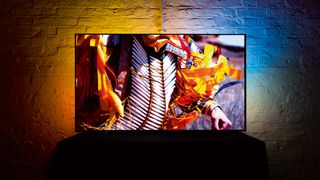Carry on Canyoning: How we captured Arizona at 1000fps for Philips OLED TV
Ambilight makes everything better
In February, two lucky readers were offered the chance to join on a once-in-a-lifetime trip to the Arizona desert, in partnership with Philips. Six months, thousands of miles and a whole lot of sand later (it's everywhere), you can now see part two of the Extreme Earth series.
The resulting 90-second video (click here to watch) is a spectacular piece of desert eye-candy made by possible by some of the most advanced 4K cameras on the planet and a tremendous effort from a crew of creatives, clients and competition winners.
Beginning and ending in Las Vegas, with a solid stint in the city of Page Arizona in-between, the video features the team hooning across the desert in tricked-out 4x4s, explored stunning slot canyons buried hundreds of feet into the ground and camped out beneath an impossibly sparkly night sky by firelight.
To capture the latter, the crew laid out motorised tracks and high-resolution stills cameras, capturing spectacular moving timelapses of the skies above. And to capture the roaring fire, the services of Dustin Farrell were enlisted, a high-speed cameraman equipped with a Phantom Flex 4K.
Capable of shooting 1,000fps at 4K, the Phantom Flex is part supercomputer, part video camera and came to us fresh off the set of a Hollywood movie. To put some meat on those bones: just five minutes captured with the Flex uses around 3TB of data.
The proof is in the pudding, of course, so be sure to watch the premiere of Extreme Earth II above to learn more. And, if you're interested in seeing how the video was made (along with how the readers got along), check out the "making of" documentary below.
OLED + Ambilight: The Ultimate TV Experience
If you’re going to fly a production crew—plus prize winners—halfway around the world, you have to be sure the film you’re making is going to look its absolute best.
Thankfully, part two of Philips’ Extreme Earth series was shot for the incredible 65-inch OLED803 TV.
These Ultra HD, OLED sets offer the infinite contrast ratio the film crew were banking on when they shot their overnight timelapses, as well as HDR, allowing the crew’s footage from the canyons—where there was often a huge difference between the brightest area of a frame and the darkest—to stand out without clipping detail in the highlights or losing important textures in the shadows.
Philips’ P5 Perfect Picture Engine results in the sharpest images, the smoothest, most natural looking motion as well as HDR processing. Picture quality isn’t the only headline.
Now, the premiere TV was set up by Philips’ own experts, but fortunately (if you don’t have your own TV expert to hand) there are various built-in wizards designed to get your TV set up and looking its best in no time. Plus, with Android TV built-in, you have access all the smart TV features and on-demand services you need.

One of the stars of the show—and the reason the intrepid crew’s location was chosen—was Philips’ Ambilight technology. Ambilight is a series of LEDs behind the TV that detect colours near the edge of the display and fire them backwards onto nearby walls, producing a more immersive, colourful and impactful show.
That means the neon of Las Vegas appear to spill well beyond the TV’s generous frame, while the orange walls of the canyon extend past the edges of the screen to produce an experience as close as you get to being there without picking desert sand out of your teeth.
Get daily insight, inspiration and deals in your inbox
Get the hottest deals available in your inbox plus news, reviews, opinion, analysis and more from the TechRadar team.
